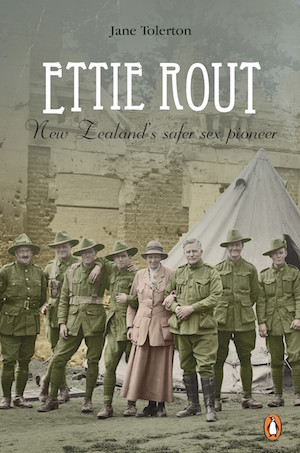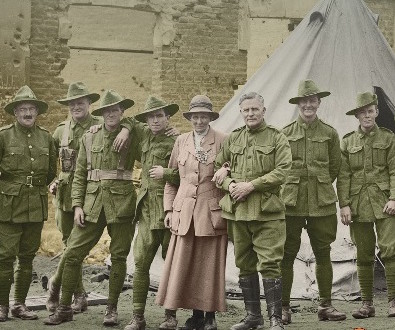The guardian angel of the Anzacs: a safe-sex campaigner ahead of her time.
By Jane Tolerton, with the New Zealand Sexual Health Society.
Publication supported by the Lottery World War One Commemorations funding.

Ettie Rout: New Zealand’s safer sex pioneer details the achievements of a daring and adventurous woman who pioneered safer sex initiatives for our troops in World War One.
She designed a safer sex kit which was adopted by the New Zealand army – and at her insistence it was compulsory: soldiers had to take one when going on leave. In Paris she set up safer sex brothel – and ran a total social and sexual welfare service for New Zealand troops.
In this book published as part of the centennial commemorations, author Jane Tolerton masterfully presents an unlikely World War One heroine. A shorthand typist, journalist and public health activist, Ettie approached her mission with a wicked sense of humour, an intolerance of hypocrisy and boundless energy.
She saw the high venereal disease rate among New Zealand soldiers as a medical problem, not a moral one. Telling the men not to take the risk of having sex clearly didn’t work. She was accused of ‘trying to make vice safe’. She answered, ‘Why should it be left dangerous?’ – as she developed methods that worked.
‘We shall never conquer this greatest of national perils simply by spreading pious fluff over the landscape. Cannot we simply take our courage in our hands and face the facts of life as they really are?’ —Ettie Rout
Having persuaded ‘Madame Yvonne’ to turn her licenced house into a safer sex brothel and let her supervise its operation, Ettie then made it her business to persuade the men to go there rather than having sex with women they met in Paris. All other brothels were dangerous; under the French system they were inspected, but any client could introduce disease, so this was no guarantee of safety.
H.G. Wells dubbed her ‘that unforgettable heroine’; a French VD specialist called her ‘a real guardian angel of the Anzacs’; and an English bishop called her ‘the wickedest woman in Britain’. Meanwhile the New Zealand Government banned all mention of soldier VD from the newspapers. In 1918 Prime Minister William Massey was still opposed to kits because they would lead to “an orgy of immorality” and would be “the downfall of the Empire but was too phobic about the subject to learn that they had already been introduced and were lowering the VD rate.
This book celebrates a brave woman of the First World War who is now internationally recognised for waging a successful public health crusade. A woman way ahead of her time.
‘ . . . but when you’ve been 12 months in mud and slush up in the tranches, you don’t take any notice of anyone, do you? You’ve got 10 days’ leave and you got as much pleasure out of life as you could. When I went to Paris I went with a chap. We went back, and back up the line, and he was killed the next day. Can you blame anybody for having a good time and enjoying themselves?’ —Charles Morse, veteran
Notes of interest:
· The VD infection rate was probably about 20% of the approximately 100,000 men who served with the NZEF overseas.
· There were about 70,000 women described as ‘boulevard girls’, ‘joy girls’ or ‘street women’ in Paris in 1918 — of which, according to inspections done that year, the majority had VD. A sudden round-up found 91 out of 101 were infected; another round-up, 55 out of 72.
· A prophylactic kit contained calomel ointment, condoms and Condy’s crystals (potassium permanganate).
About the author:
Jane Tolerton is a Wellington writer. Having studied History and American Studies at the University of Canterbury, she became a newspaper reporter and magazine feature writer, winning the Dulux News Award and the Cowan Prize for Historical Journalism.
She and Nicholas Boyack set up the World War One Oral History Archive while based at the Stout Research Centre at Victoria University of Wellington in 1987. They interviewed 84 veterans and produced In the Shadow of War (1990). Tolerton’s bestselling An Awfully Big Adventure: New Zealand World War One veterans tell their stories, is a chronological oral history of the war edited from the interviews. It was one of the New Zealand Listener’s 100 Best Books of 2013.
Her other oral history books are Convent Girls (1984), Sixties Chicks (1987) and It’s Time We Started Telling These Stories (2008), which was part of the It’s Not Okay campaign against family violence.
Ettie Rout: New Zealand’s safer sex pioneer by Jane Tolerton
1 September 2015 | RRP $35.00 | Penguin
Competition is now closed. Thank you.









Belladonna - 10 years ago
Convent girls & Sixties chicks